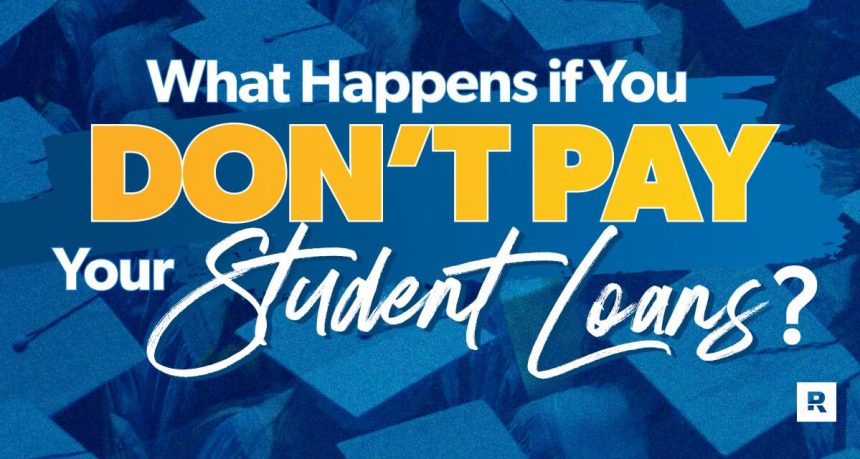Federal student loan payments have officially started back. And maybe you’re already struggling to cover your payment every month.
But what would happen if you just . . . didn’t pay?
Unfortunately, ignoring your student loans will only make things way worse. Just a few things you can expect: being reported to credit agencies, late fees and payments being taken straight out of your paycheck. You could even be looking at some court time if things aren’t cleared up. Yikes!
The good news is, there are ways to avoid these penalties and get on top of your student loan payments.
What Happens If You Don’t Pay Your Student Loans?
As tempting as it may be to ignore your student loans and not pay them, it doesn’t come without consequences (some more intense than others). But what happens to you ultimately depends on the type of student loan you have: federal or private.
If You Don’t Pay Federal Student Loans
Federal student loans are owned by the U.S. Department of Education, and federal loan servicers have the power of the government behind them to get money from you. (Yikes!) That said, here’s what happens if you don’t pay your federal student loans:1
- Your loan becomes delinquent immediately after you miss a payment. You’ll probably get charged a late fee (usually up to 6% of the monthly payment).2
- Your loan servicer will report your student loan as delinquent. If your payment is 90 days (3 months) late, the major credit agencies (Experian, Equifax and TransUnion) will know about it.
- Your loan will go into default. This is usually after 270 days (9 months) of missed payments.
Once your federal student loan is in default, here’s what happens next:3
- Your entire loan balance becomes immediately due (plus interest). This is called loan acceleration—and yeah, it’s as scary as it sounds.
- The default is reported to credit agencies.
- You can’t apply for deferment or forbearance.
- You’re no longer eligible for an income-driven repayment plan.
- You can’t apply for more financial aid (including grants).
- Your wages can be garnished, as well as your tax refund and Social Security benefits. This means the government can take your student loan payment straight out of your paycheck, no questions asked (oof!).
- You could be taken to court. Your lender can sue you for the money you owe.
On-Ramp Period
From now until September 30, 2024, federal student loan borrowers who miss payments won’t have to face the consequences we just listed.4 (This only applies to federal loans that were previously on pause.)
During this temporary period, loans won’t go into default, delinquencies won’t be reported to credit agencies, and loans won’t be sent to collections. But your payments will still be due, and interest will still make your balance grow—so don’t use this time as an excuse to not pay your student loans!
If You Don’t Pay Private Student Loans
Private student loans are owned by private lenders, so the rules are a little different when it comes to not paying them back. They may not have the same power federal lenders do, but you definitely don’t get off easy!
Ready to get rid of your student loans once and for all? Get our guide.
The consequences for not paying your private loans depends on your specific lender. But here’s generally what happens:
- Most private student loans are delinquent immediately after you miss a payment.
- As soon as your loan is delinquent, you’ll get charged a late fee (either a flat fee or a certain percentage of your monthly payment).
- After 30 days, your lender can report your delinquency to credit agencies.
- After 90 days (3 months), your private student loans go into default. This is much sooner than federal loans!
Once your private student loan is in default, here’s what can happen:
- Your loans get sold to a collections company. And listen, debt collectors can be pretty ruthless.
- Your credit score takes a hit, as well as anyone who cosigned for you. While we don’t put much stock in credit scores, you definitely don’t want to trash your credit.
- You can be taken to court. Your lender can sue you for the money you owe.
- Your wages may be garnished. But this only happens if your lender sues you and gets a court order to do so. They can’t take anything from your tax refunds or Social Security checks, though.
Can You Go to Jail for Not Paying Your Student Loans?
No, you can’t go to jail for not paying your student loans. So if that was a fear you had, take a deep breath—no one is coming to arrest you if you miss a payment.
But like we mentioned, you can be sued over defaulted student loans. This would be a civil case—not a criminal one. So, again, you don’t have to worry about doing any jail time if you lose. But unless you want to deal with a drawn-out legal mess while paying attorney fees and other court costs, do whatever you can to keep from defaulting on your loans.
Can You Get Rid of Student Loans Through Bankruptcy?
Technically yes. But it’s not easy, or even realistic. As a general rule, student loans cannot be cleared through filing bankruptcy. This is especially true for federal loans—because you know the government’s getting their money back one way or another.
There is the rare chance of student loans being discharged (cleared) through a separate bankruptcy process called an adversary proceeding. You basically have to prove you wouldn’t be able to eat if you paid your student loan payments. But the odds aren’t great. Less than 1% (0.1% to be exact) of people who try to have their student loans discharged through bankruptcy are actually successful.5 Plus, bankruptcy is a long and brutal process that should be avoided at all costs.
What to Do If You Can’t Pay Your Student Loans
We get it. No one likes having to pay back their student loans. But as you can see, you either pay up or pay the price—one way or another. So if you’re able to pay back your loans, you need to. But if you’re actually struggling to make your student loan payment, here are the steps to take:
Contact Your Loan Servicer
If you think you’re going to miss your payment, get ahead of it by contacting your student loan servicer. They’ll probably try to move you to a different payment plan, most likely an income-driven repayment plan (like the SAVE plan) to make your monthly payments more manageable. But don’t let a lower payment keep you from trying to get rid of your student loans as fast as possible!
If you’re going through a particularly rough time financially (for example, you lost your job or you had a medical emergency), your loan servicer might recommend applying for deferment or forbearance. But in most cases, interest continues to add up and you’re just pushing your loans to the side for later—so that should be your last resort! Only go that route if you’re not able to pay for the basic necessities (food, housing, utilities and transportation).
Get on a Budget
Don’t have enough money for your student loan payment? Then you need to get on a budget. If things feel out of control with your money, a budget helps you feel in control. When you write everything out and see exactly what you’re spending, you can find ways to free up more money for your student loans (and any other debt payments). And this helps you every single month. Go ahead and create your budget for free right now with EveryDollar!
Lower Your Expenses
Once you’ve made your budget, start cutting your spending. Can you dial back the amount of money you spend eating out each month? Do you really need all those subscriptions and memberships? (Those suckers add up!) We know it’s not fun having to tell yourself no. You’d much rather buy that overpriced margarita than think about paying off your student loans. But the little sacrifices add up and keep you from falling behind on your payments.
Increase Your Income
If you lower your spending and still don’t have enough to afford your payment, it may be your income that’s the problem. So, find ways to get your income up. Can you take on more hours at your current job? Are you a freelancer who can work with more clients? Or you can pick a side hustle (or two) to get some extra cash flowing into your budget. Even spending a little bit of time each week walking dogs, delivering food or babysitting can help you cover your payment. Remember: It’s only temporary until you knock out your loans. You got this!
Cover Your Student Loan Payment With Confidence!
Make a plan for your money and make progress on your loans. EveryDollar puts you in control.
Create Your Free Budget
Read the full article here
















